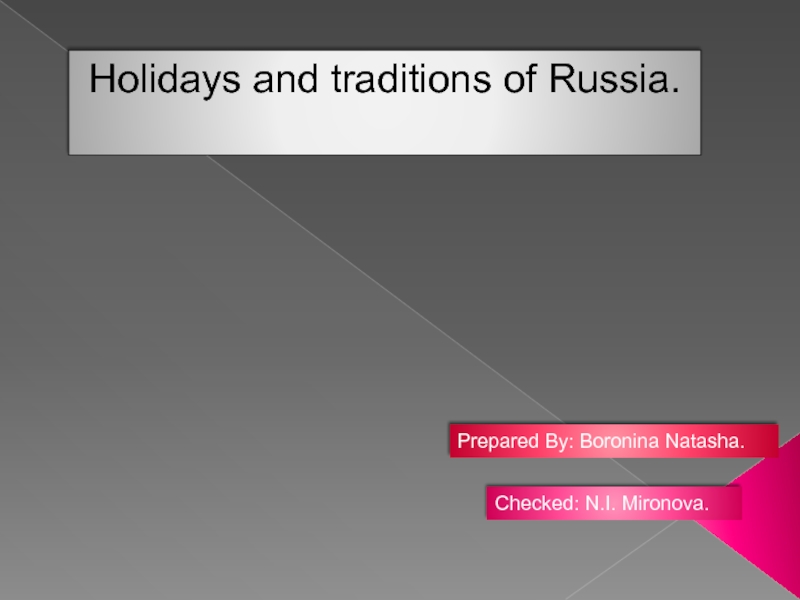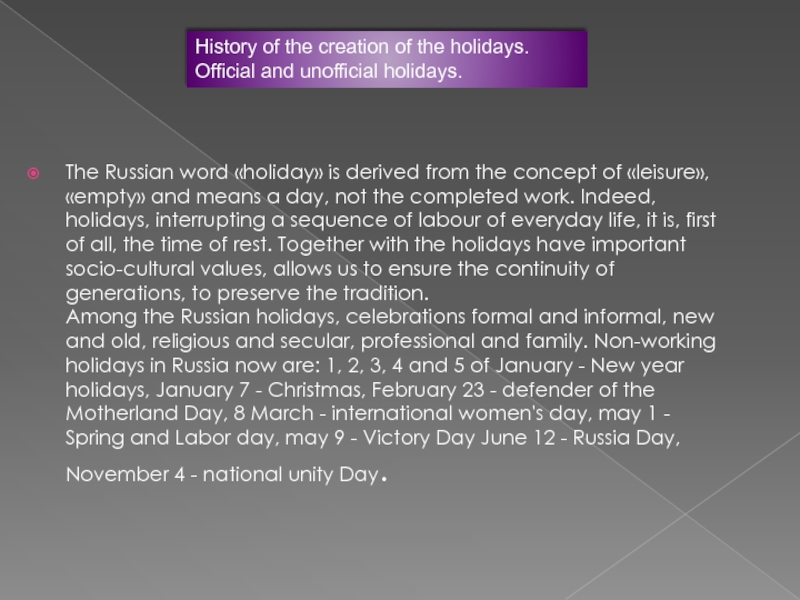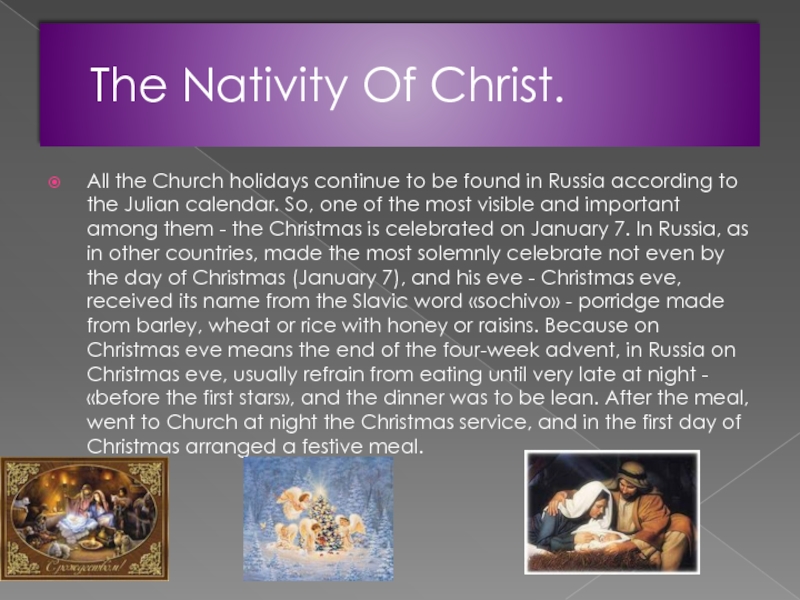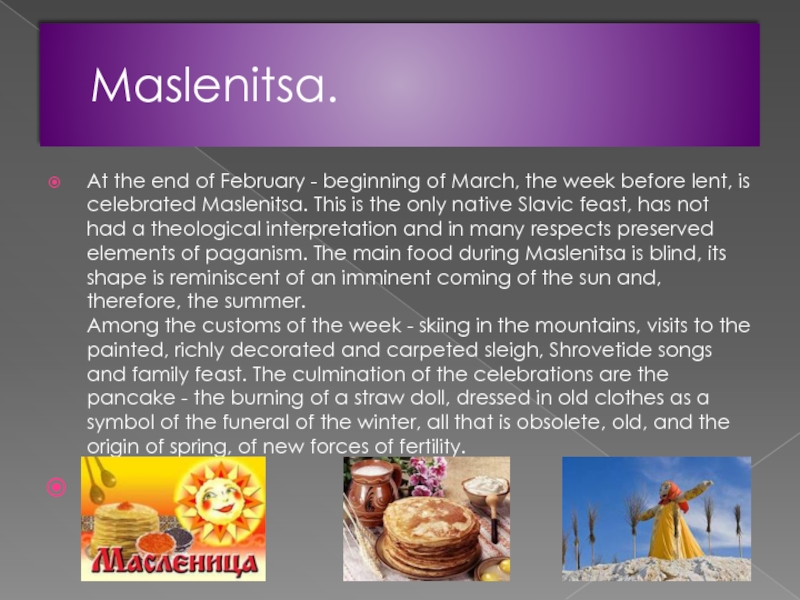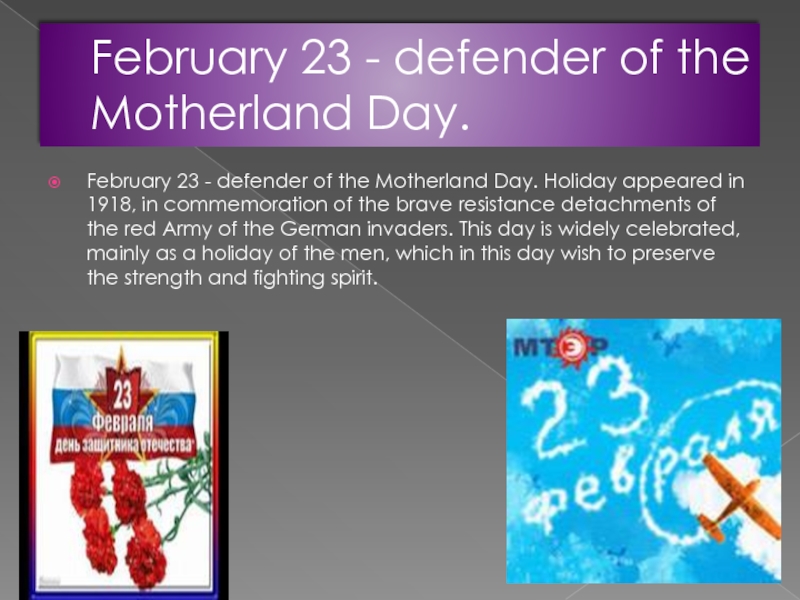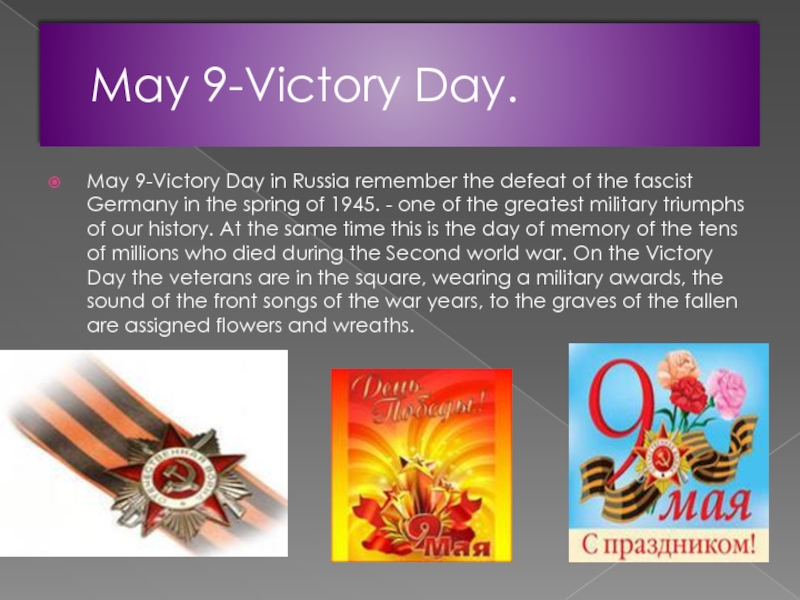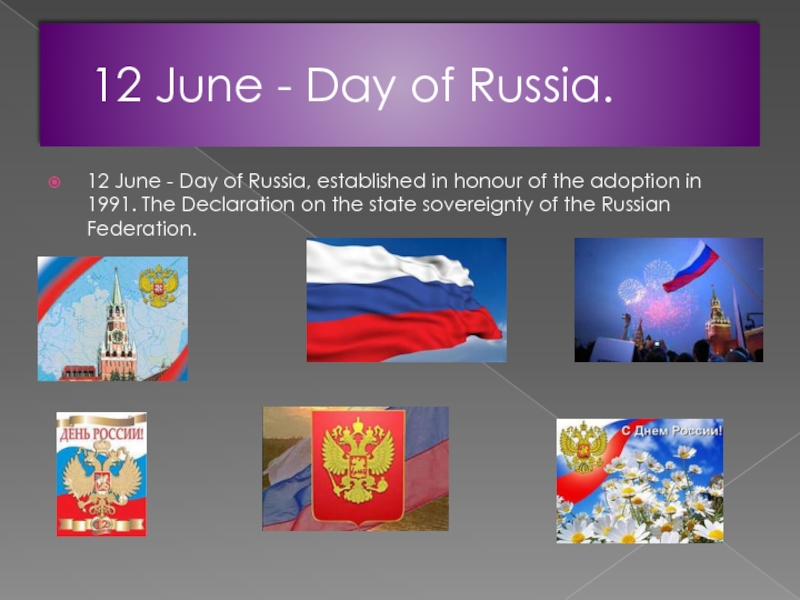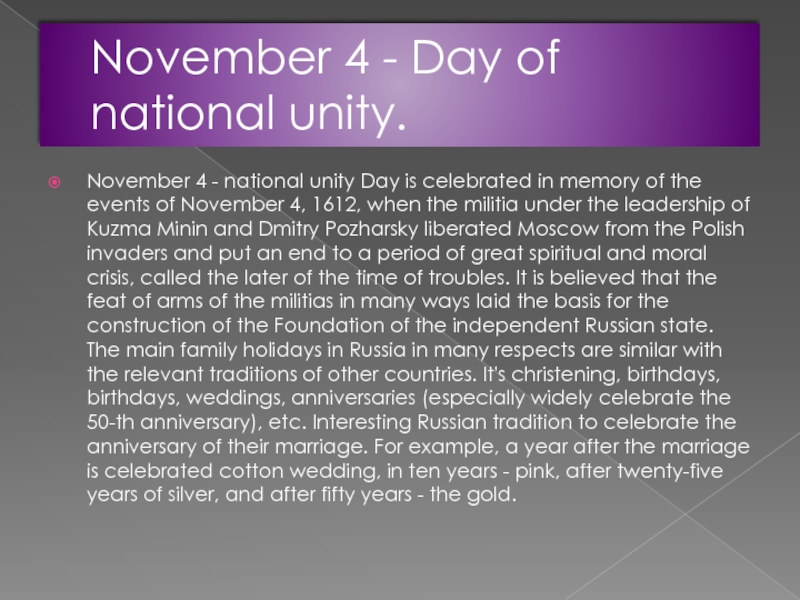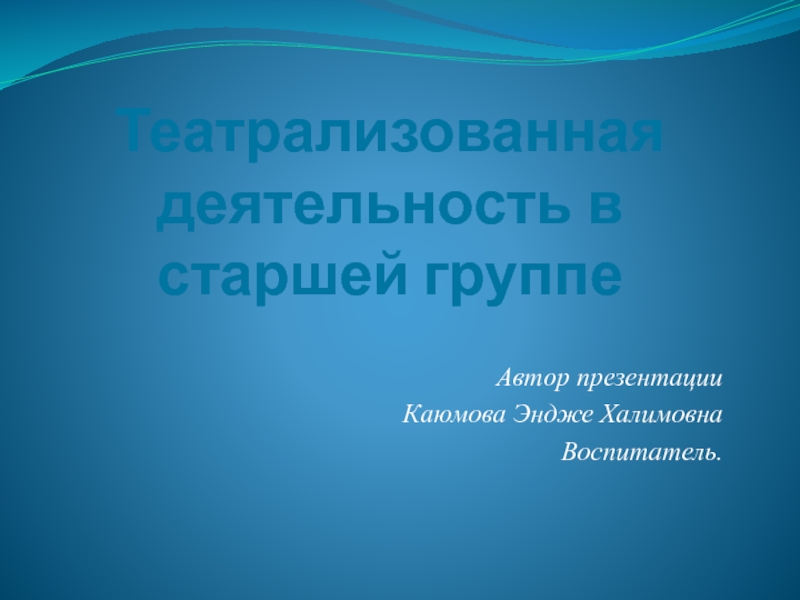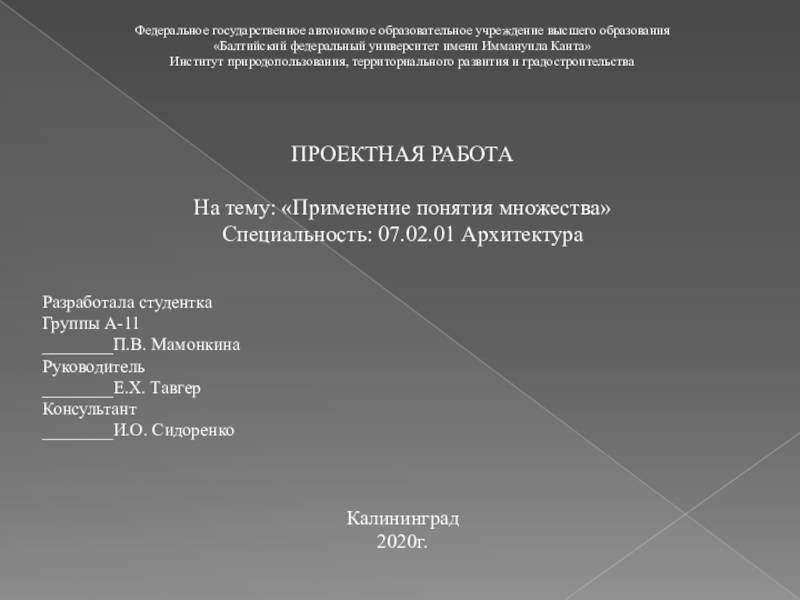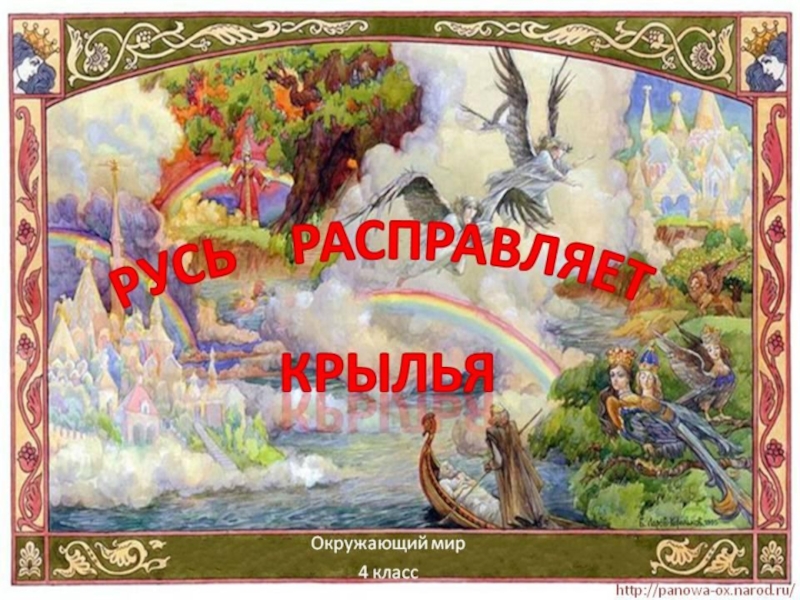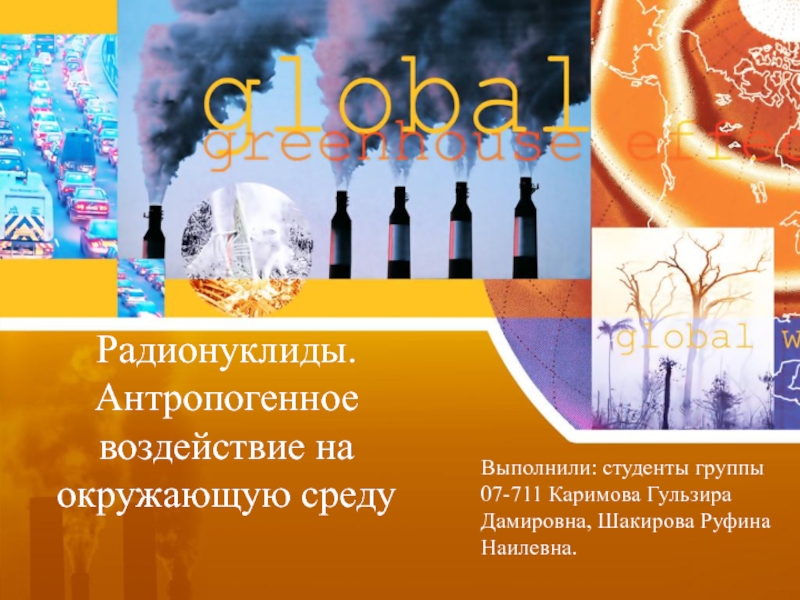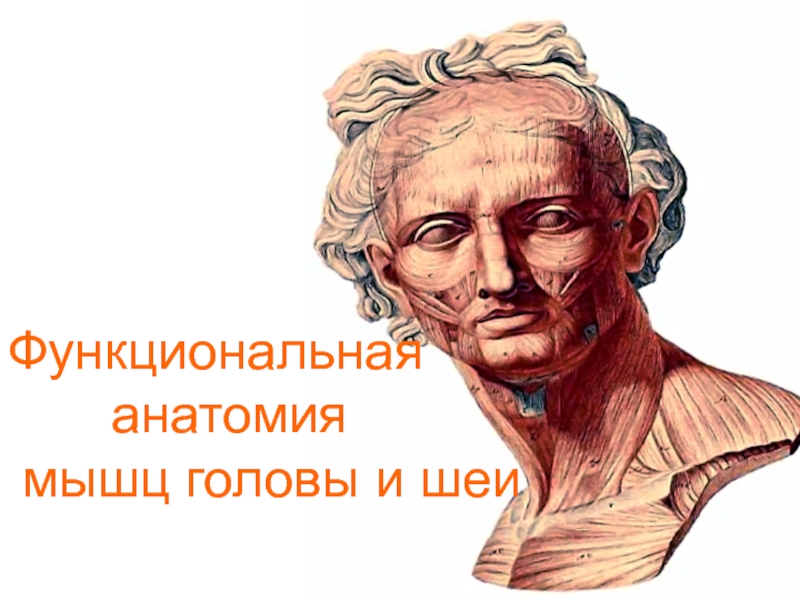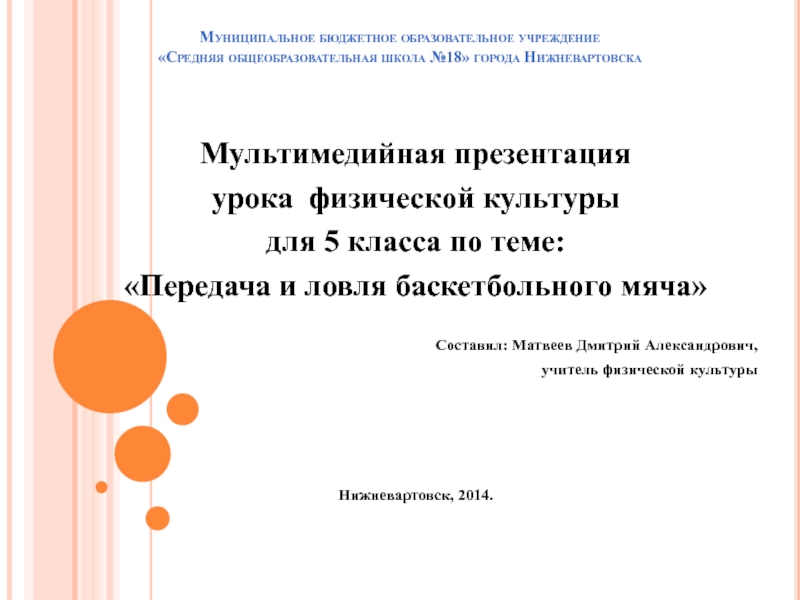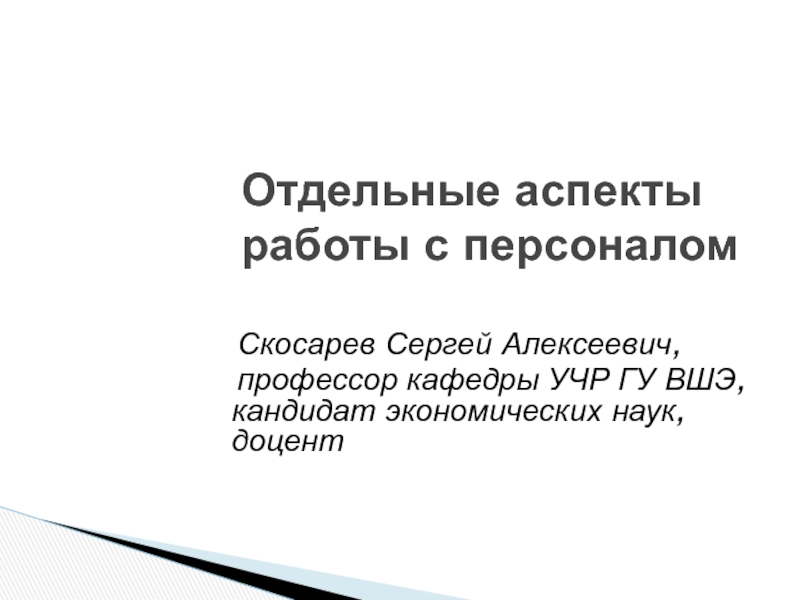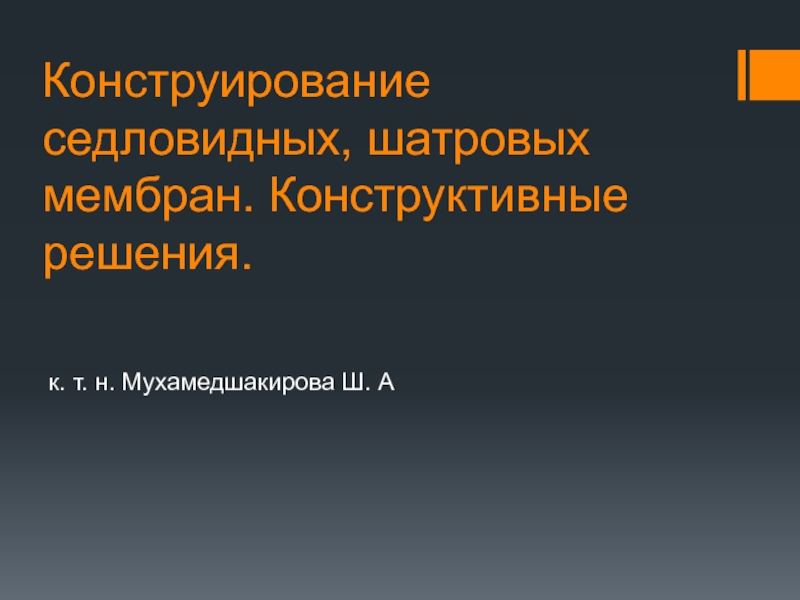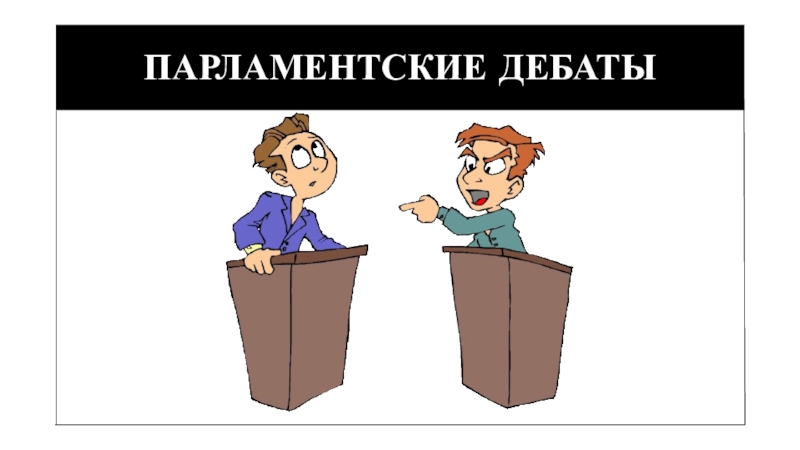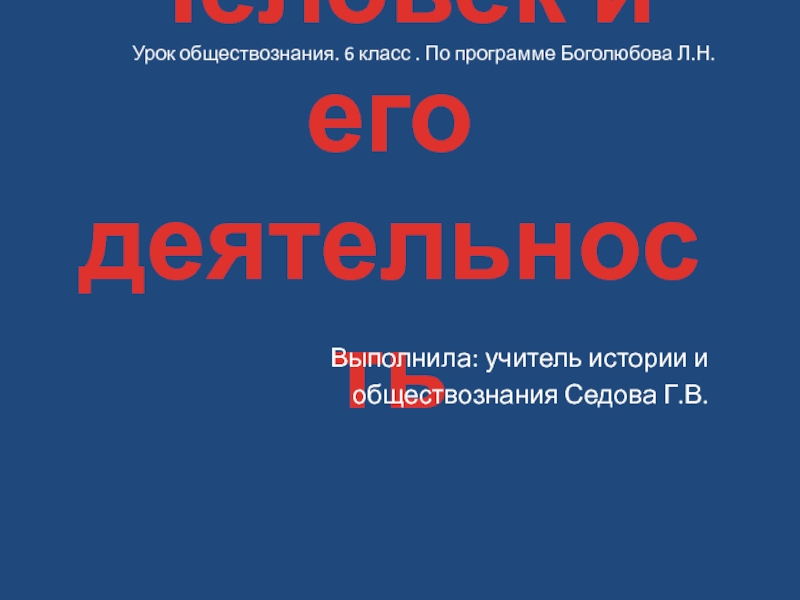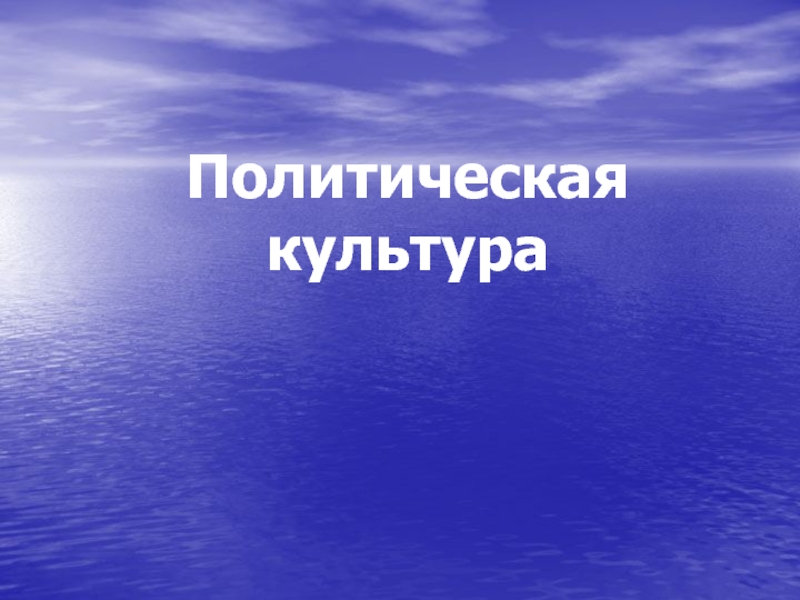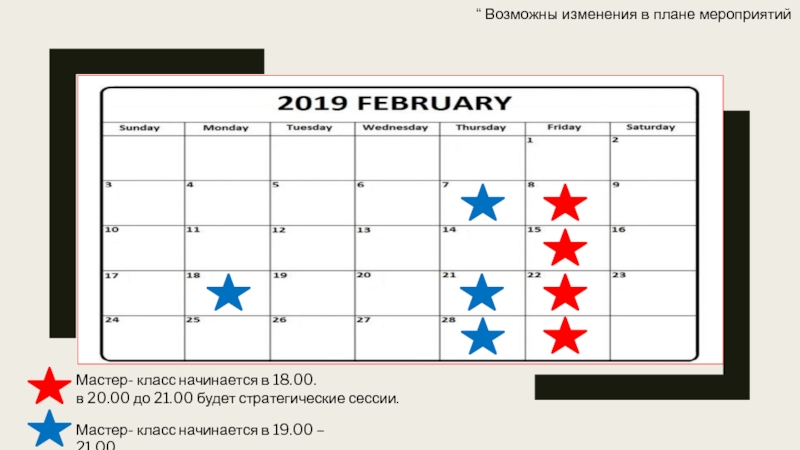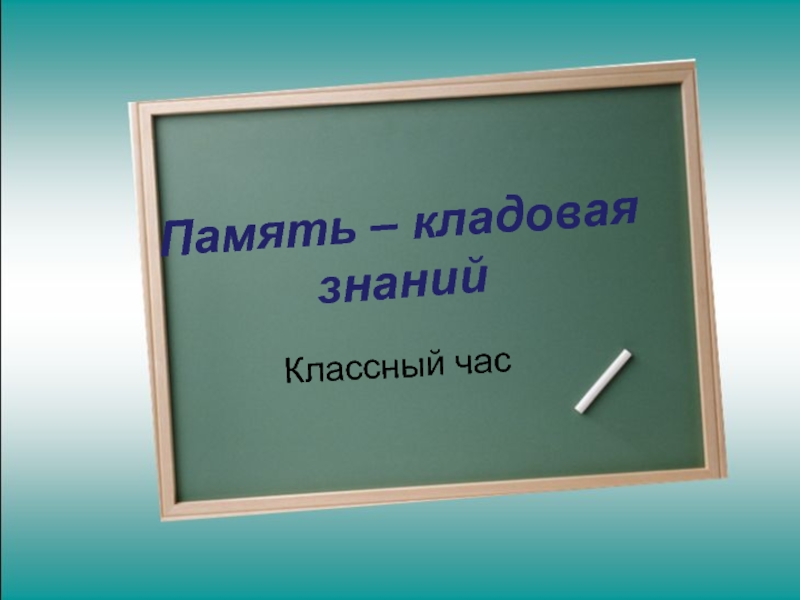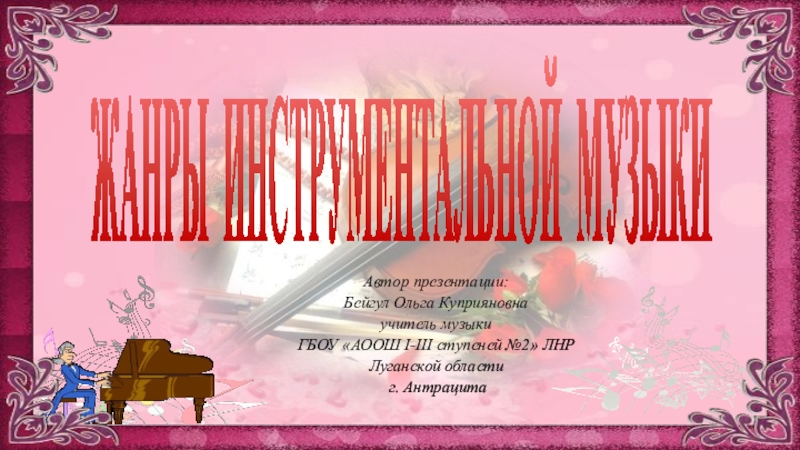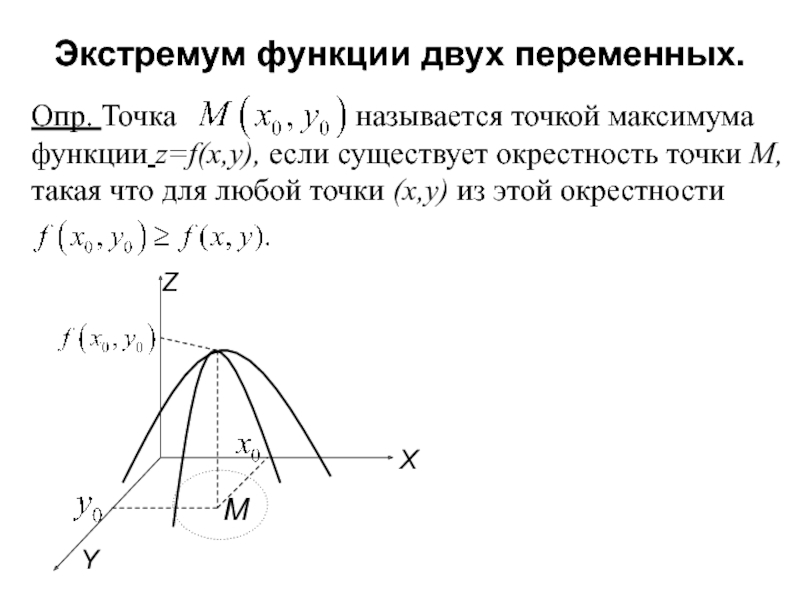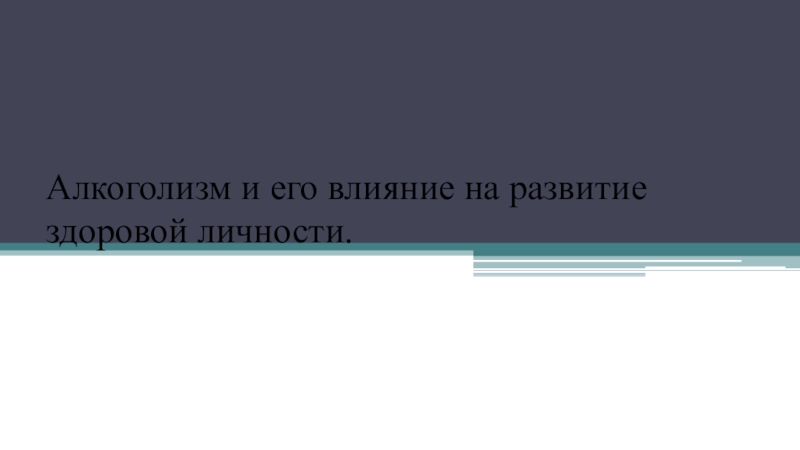Слайд 1Holidays and traditions of Russia.
Prepared By: Boronina Natasha.
Checked: N.I. Mironova.
Слайд 2The Russian word «holiday» is derived from the concept of
«leisure», «empty» and means a day, not the completed work.
Indeed, holidays, interrupting a sequence of labour of everyday life, it is, first of all, the time of rest. Together with the holidays have important socio-cultural values, allows us to ensure the continuity of generations, to preserve the tradition.
Among the Russian holidays, celebrations formal and informal, new and old, religious and secular, professional and family. Non-working holidays in Russia now are: 1, 2, 3, 4 and 5 of January - New year holidays, January 7 - Christmas, February 23 - defender of the Motherland Day, 8 March - international women's day, may 1 - Spring and Labor day, may 9 - Victory Day June 12 - Russia Day, November 4 - national unity Day.
History of the creation of the holidays. Official and unofficial holidays.
Слайд 3New year. The history of creation.
The first - both in
order and in terms of the scale of fun -
there is a New year. Perhaps, no other holiday is waiting with such impatience. Children dream about Christmas gifts, adults - to the most cherished dreams come true, and all wish each other happiness and joy in the coming year. With the approach of the holiday for children arranged matinees, for those who are older, balls - and variety performances. However, the New year of the majority of Russians meets the home, in the family circle, dress up the tree and lay the holiday table.
The first New year in Russia is celebrated on the night from 31 December to 1 January 1700 by Peter I. prior To the beginning of the year in Russia accounted for 1 September, and even earlier - before the end of the XV century. - on 1 March. According to the European standard, a symbol of the new year holidays in Russia became the fir-tree. Meanwhile in Petoskey decree 1699, it was still not specifically about the tree, and the tree at all. At first they were decorated with nuts, sweets, fruit and even vegetables, and decorate the Christmas tree became the only since the middle of XIX century. For the first time dressed up fur-tree in Russia shone lights in 1852, in St. Petersburg in the room of the Catherine (now Moscow) railway station. In the middle of the XIX century in Russia there appeared the first Christmas toys, jewelry, belts, multi-colored paper. At the end of the century became a tradition fashion theatre performances, often which copied the secular balls.

Слайд 4New year.
The first Santa Claus (analog of the Western
Santa Claus)and, subsequently, his granddaughter snow maiden after the same-name
Opera of Rimsky-Korsakov, delighted the audience. In the first years of Soviet power the celebration of the Christmas tree was not encouraged, it was considered that this bourgeois relic, but later the tradition has been restored. In the Soviet time in the menu of new year's table included jelly, herring, Baltic sprats, Olivier salad, and a bottle of «Soviet champagne» the battle of the Kremlin chimes was the culmination of the new year celebrations. At the same time appeared the annual «Blue lights», and later and special new year's films.
Слайд 5Old New year.
The night of the 14th of January is
called in Russian Old New year. Before 1918 in Russia
acted the Julian calendar, which outpaced the spread in Europe of the Gregorian for 13 days. A decree of the Soviet government, dated January 24, 1918. Russia began to live on the same calendar as the rest of the country, however, for a long time all of the dates indicated with the mark of the "new style" or "old style". Over time to the new calendar used to, but the tradition to celebrate the Old New year remained. This holiday is often is more fun and democratic, the more solemn meeting of the New year, a battle of the capital chiming clock.
Слайд 6The Nativity Of Christ.
All the Church holidays continue to be
found in Russia according to the Julian calendar. So, one
of the most visible and important among them - the Christmas is celebrated on January 7. In Russia, as in other countries, made the most solemnly celebrate not even by the day of Christmas (January 7), and his eve - Christmas eve, received its name from the Slavic word «sochivo» - porridge made from barley, wheat or rice with honey or raisins. Because on Christmas eve means the end of the four-week advent, in Russia on Christmas eve, usually refrain from eating until very late at night - «before the first stars», and the dinner was to be lean. After the meal, went to Church at night the Christmas service, and in the first day of Christmas arranged a festive meal.
Слайд 7Christmas-tide.
With Christmas begin Christmas eve - the twelve days prior
to the Baptism of the Lord (19 January). The main
Christmas entertainment - in masks, divination and Christmas carols - rite, which consists in the fact that the house with the songs of the group, carrying a paper star, attached to a stick (the symbol of the star of Bethlehem).
Слайд 8Maslenitsa.
At the end of February - beginning of March, the
week before lent, is celebrated Maslenitsa. This is the only
native Slavic feast, has not had a theological interpretation and in many respects preserved elements of paganism. The main food during Maslenitsa is blind, its shape is reminiscent of an imminent coming of the sun and, therefore, the summer.
Among the customs of the week - skiing in the mountains, visits to the painted, richly decorated and carpeted sleigh, Shrovetide songs and family feast. The culmination of the celebrations are the pancake - the burning of a straw doll, dressed in old clothes as a symbol of the funeral of the winter, all that is obsolete, old, and the origin of spring, of new forces of fertility.
Слайд 9February 23 - defender of the Motherland Day.
February 23 -
defender of the Motherland Day. Holiday appeared in 1918, in
commemoration of the brave resistance detachments of the red Army of the German invaders. This day is widely celebrated, mainly as a holiday of the men, which in this day wish to preserve the strength and fighting spirit.
Слайд 10International women's day - 8 March.
It was not even two
weeks, as there is international women's day - 8 March.
On this day, mothers, wives, co-worker to give flowers and gifts. The holiday was first celebrated in Russia in 1913. The decision on the annual celebration of International women's day was taken in 1910, on the 2-nd International conference of socialists in Copenhagen at the suggestion of Clara
Слайд 11Easter.
In April - beginning of may account for the celebration
of Easter. The exact date shall be calculated annually for
special tables. Easter - as mentioned in the old days, "a holiday festival and the festival of festivals" - the day the memories of the life, the sufferings and resurrection of Jesus Christ. Associated with the Passover rites, the all-night vigil, a cross procession around the Church, dyeing eggs and baking cakes. This holiday is so common in Russia, that he does not shun even the most unbelieving people. He is to exchange kisses with a greeting-greeting: "Christ is risen!" and the answer: "he is risen Indeed!" - exchange and following this, the painted eggs. Egg, which is traditionally painted in red color and its shades, a mandatory attribute and symbol of the Christian Passover from the XII. In addition to the splendid natural eggs, the Easter prepared and even special gift of precious metals, glass, crystal, porcelain with painting. More than all the manufacture of such eggs famous jeweler Carl Faberge. An indispensable decoration of Easter table is also considered to be the Easter bread - cake, baked from short dough. Cake necessarily should be high and have a round form. This is due to the fact that, according to legend, the shroud of Christ was a round shape. At the top panettone spread the cross of the test.
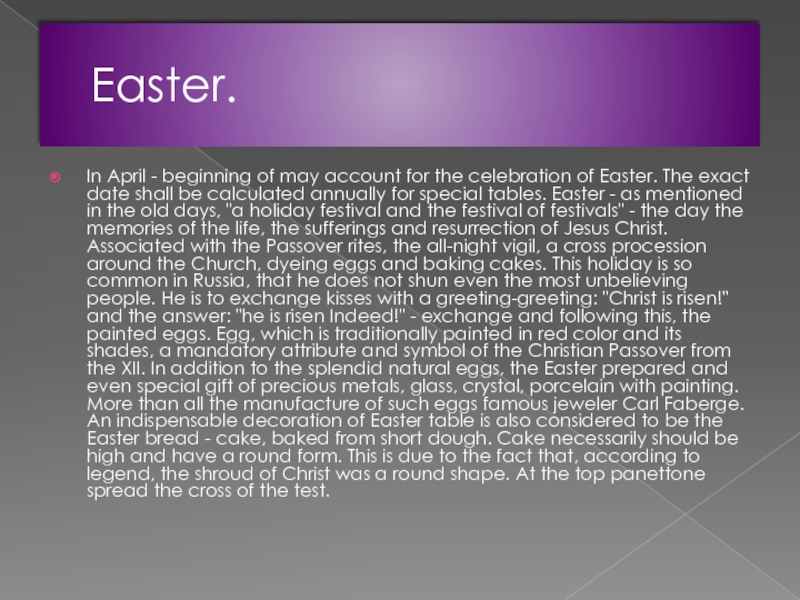
Слайд 13May 1 - Holiday of Spring and Labour.
May 1 -
Holiday of Spring and Labour - previously called the Day
of international solidarity of workers. The festival has its origin in 1889., when at the Paris Congress of the second international was decided to celebrate this day in memory of the workers of Chicago on may 1, 1886. As such, the First of may is celebrated in Russia since 1891., mainly festive processions and demonstrations. Now the majority of Russians prefer to spend this day in nature, many leaving the city.
Слайд 14May 9-Victory Day.
May 9-Victory Day in Russia remember the defeat
of the fascist Germany in the spring of 1945. -
one of the greatest military triumphs of our history. At the same time this is the day of memory of the tens of millions who died during the Second world war. On the Victory Day the veterans are in the square, wearing a military awards, the sound of the front songs of the war years, to the graves of the fallen are assigned flowers and wreaths.
Слайд 1512 June - Day of Russia.
12 June - Day of
Russia, established in honour of the adoption in 1991. The
Declaration on the state sovereignty of the Russian Federation.
Слайд 16November 4 - Day of national unity.
November 4 - national
unity Day is celebrated in memory of the events of
November 4, 1612, when the militia under the leadership of Kuzma Minin and Dmitry Pozharsky liberated Moscow from the Polish invaders and put an end to a period of great spiritual and moral crisis, called the later of the time of troubles. It is believed that the feat of arms of the militias in many ways laid the basis for the construction of the Foundation of the independent Russian state.
The main family holidays in Russia in many respects are similar with the relevant traditions of other countries. It's christening, birthdays, birthdays, weddings, anniversaries (especially widely celebrate the 50-th anniversary), etc. Interesting Russian tradition to celebrate the anniversary of their marriage. For example, a year after the marriage is celebrated cotton wedding, in ten years - pink, after twenty-five years of silver, and after fifty years - the gold.
Слайд 17November 4 - Day of national unity.
Слайд 18Professional holidays.
January 12 - Day of the worker of the
Prosecutor's office. On this day in 1722, by the decree
of Peter I was instituted by the Prosecutor's office as a body of state power.
13 January - the Day of the Russian press. Is celebrated on the anniversary of the publication of the first Russian printed newspaper in 1703.
10 February - the Day of the diplomatic worker. On this day 1549, is the earliest reference to the Embassy of the order - the first of the foreign Affairs agencies of Russia.
April 12th - Day of Astronautics. Is celebrated on the anniversary of the space mission of the world's first cosmonaut Yuri Gagarin in 1961.
7 may - the Day of radio. It is noted in the anniversary of a demonstration of the world's first radio receiver, presented by the Russian scientist Alexander Popov in 1895.
The third Sunday of June - the Day of medical worker.
The second Sunday of August - Day of the Builder.
The third Sunday of September - the Day of workers of the forest.
October 25 - Day of customs officer.
10 November - the Day of militia (founded in 1918).
December 20 - Day of the worker of the security.

Слайд 19The tradition.
In the everyday life of Russians also there are
a number of established practices, which, however, are changing faster
than the traditions of the holidays. So, in Russia, children under the age of 18, often live together with their parents until marriage/marriage, and marriages are often at the age of 23-25 years. In the summer of Russians with pleasure canned fruits and vegetables, which are often grown in your own garden or the garden (in addition to many apartments also have a country cottage). Russians usually bear late, like in the evening to drink tea in the kitchen with a long conversations, do not hesitate to borrow salt or matches the neighbors, when suddenly end their. Due to a shortage of time and love to the literature of many read in the transport.
Steam room - the oldest element of Russian life - now, first of all, one of the best ways to communicate with friends. The main attributes of a Russian bath - steam, a birch or oak broom, fragrant tea with herbs, kvass and beer.
Слайд 20Literature.
http://www.rigatur.com/russia/russia/traditions/
http://yandex.ru/yandsearch?text=%D0%BF%D0%B5%D1%80%D0%B5%D0%B2%D0%BE%D0%B4%D1%87%D0%B8%D0%BA+%D1%81+%D0%B0%D0%BD%D0%B3%D0%BB%D0%B8%D0%B9%D1%81%D0%BA%D0%BE%D0%B3%D0%BE+%D0%BD%D0%B0+%D1%80%D1%83%D1%81%D1%81%D0%BA%D0%B8%D0%B9&clid=1537597&lr=15
